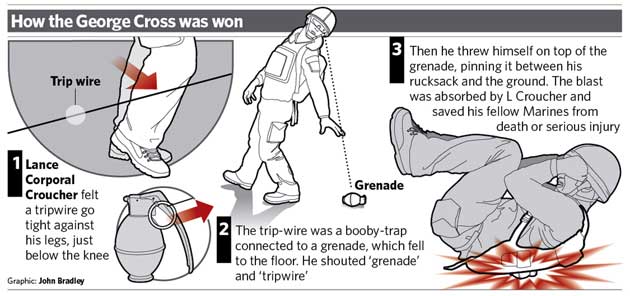George Cross for the soldier who threw himself on a grenade

Your support helps us to tell the story
From reproductive rights to climate change to Big Tech, The Independent is on the ground when the story is developing. Whether it's investigating the financials of Elon Musk's pro-Trump PAC or producing our latest documentary, 'The A Word', which shines a light on the American women fighting for reproductive rights, we know how important it is to parse out the facts from the messaging.
At such a critical moment in US history, we need reporters on the ground. Your donation allows us to keep sending journalists to speak to both sides of the story.
The Independent is trusted by Americans across the entire political spectrum. And unlike many other quality news outlets, we choose not to lock Americans out of our reporting and analysis with paywalls. We believe quality journalism should be available to everyone, paid for by those who can afford it.
Your support makes all the difference.When Lance Corporal Matthew Croucher flung himself on a live grenade, he wondered just how long it would be before it detonated and what it would feel like to die. The explosion came just five seconds later.
The 24-year-old Royal Marine reserve should have been killed instantly but his rucksack and body armour absorbed so much of the blast that, astonishingly, he survived with only minor injuries. His action saved the lives of his comrades on the patrol in Helmand province, Afghanistan.
L/Cpl Croucher, from Birmingham, was awarded the George Cross yesterday for what was described as an act of "extraordinary bravery and sacrifice". He is the first reservist to receive the military's highest honour, alongside the Victoria Cross, in the current conflicts in Afghanistan and Iraq.
"I still cannot believe that I escaped so lightly. All I had at the end was a nose bleed and a headache, not even any permanent scars I can show off," he said yesterday. "But at the time, I didn't think I was going to live, I thought this was it."
L/Cpl Croucher was with a four-man team from the Royal Navy's 40 Commando Group reconnaissance team taking part in a night raid near Sangin on a compound suspected of being used for bomb-making.
After a search, the order was given to pull out and the team left, making their way out of the compound with as little commotion as possible in case Taliban fighters were waiting in ambush.
There was no gunfire but L//Cpl Croucher, who was in the lead, felt his leg brush against something on the ground. It was one of the most lethal hazards facing troops fighting an insurgency, a tripwire. He then heard the noise of the booby-trap activating – the lever of the grenade lever springing away, arming the device – before it dropped to the ground right next to him.
"The wire was tight against my leg, just under my knee" he recalled. " You know instinctively what it is, what it means. Then I heard the grenade drop, right next to me. All I could do at that moment was shout 'grenade' and then 'tripwire' to warn the others."
At that moment of great peril, many would have flung themselves on to the ground away from the grenade. Instead, he decided to dive on top of it. "The shrapnel would have gone off with a shotgun effect and spread, so I probably would have been hit anyway if I tried to get away. So I thought the thing to do was to get on top, I thought I didn't have much hope anyway but it might give others a chance.
"The first thing I did was dive on my front, I think I had seen that once on Soldier, Soldier, but then I realised that wasn't going to work, and I twisted on my back. And then I lay there thinking how long will it be before it goes off. Then there was the loudest bang I ever heard, a flash of light and I was flying through the air."
His backpack was ripped away, his body armour and helmet pitted by grenade fragments and a large battery casing used to counter roadside bombs burst into flames and "burnt like a flare". It was, said one of the doctors who later examined him, an absolutely miraculous escape. "The others were very grateful afterwards," said L/Cpl Croucher, who now works in the security industry. "There was lots of hugs and handshakes. I am just glad that we all got through it all right."
He texted his parents to say he had been put forward for the George Cross. But it wasn't until yesterday they heard the full details of what happened.
"He has always been very quiet" said his mother, Margaret, 55. "We tend to hear about what he has been up to from his friends."
Air Chief Marshal Sir Jock Stirrup, the Chief of the Defence Staff, said: "L/Cpl Croucher showed extraordinary bravery, self-sacrifice and devotion to duty. I am hugely impressed by what he did, but not surprised. He highlights the very fine calibre of young people we have in our armed forces. "
For outstanding courage...
The George Cross ranks alongside the Victoria Cross as Britain's highest award for gallantry. It was instituted in 1940 during the Blitz to recognise acts of civilian courage and is thus a civil as well as military honour. In the military the VC is awarded for gallantry in the face of direct fire while the George Cross is for outstanding courage when the enemy may not be physically present. The island of Malta was given the George Cross for collective gallantry during the Second World War and it has also been awarded to the Royal Ulster Constabulary.
Join our commenting forum
Join thought-provoking conversations, follow other Independent readers and see their replies
Comments